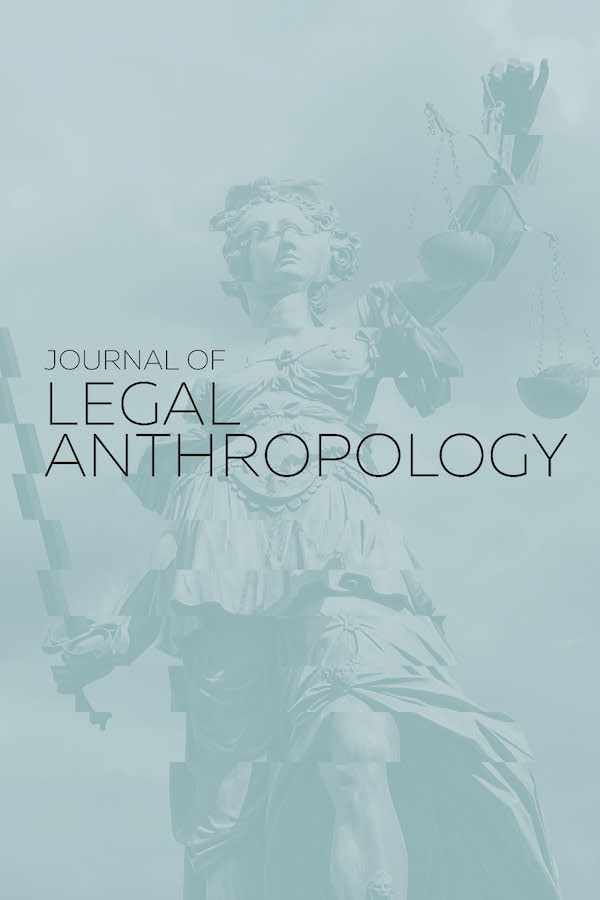
Journal of Legal Anthropology
ISSN: 1758-9576 (print) • ISSN: 1758-9584 (online) • 2 issues per year
Editor
Narmala Halstead, University of Sussex
Subjects: Anthropology, Law
Latest Issue
Volume 8 Issue 2
Trust in the state
Negotiating legal and bureaucratic encounters
Scholars have increasingly coined trust as one of the key aspects of human existence and contemporary social interactions: some see it as a form of affect, while others study the conditions under which it emerges or fades away (Weichselbraun et al. 2023). Until recently, the idea of (mis)trust had mainly been studied in connection to interpersonal relationships (Bell 2016; Carey 2017), economic transactions (Rubbers 2009) and religion (Ashforth 2005; Geschiere 2013). In a recently edited collection, Anna Weichselbraun and colleagues (2023) shifted the focus from intimate spheres to ‘technologies of trust’. This issue continues that shift, bringing the anthropological study of trust into a new field by exploring the concrete practices and effects of trust in the state, what these reveal about the ideas and imaginations of the state, and the daily practices of those who embody it.
Shattered trust
Police violence and survival at the margins of the state in São Paulo's ‘Crackland’
This article explores the dynamics of trust, mistrust, distrust and hope among homeless individuals in ‘Crackland’, São Paulo's largest open drug-use scene, where state interventions have systematically targeted marginalised populations through violence and displacement. Drawing on in-depth interviews and ethnographic research, we examine how persistent police violence influences marginalised individuals’ perceptions of and trust in state institutions. We argue that trust – and its intricate relationship with mistrust and distrust – emerges as a critical analytical lens for understanding how individuals at the margins, facing different forms of state violence, still maintain hope for a better state. By centring the experiences of those who recount encounters with physical and structural violence from state power, we demonstrate how violent interactions profoundly impact trust, generating a constrained yet resilient form of hope for an ideal state. This study contributes to anthropological understandings of state–citizen relations and illuminates the intimate ways marginalised populations navigate, resist, and reimagine institutional power.
Legal consciousness and experiences of minority parents with court cases on children in the Netherlands
Court cases on children can be particularly intense and sometimes intrusive encounters with the state for the families involved. This article focusses on the experiences of minority families with court cases on their children in the Netherlands. I analyse how parents from religious, cultural or ethnic minorities experience and understand court cases on their children, view their position vis-à-vis state actors and how the experiences of family members with state actors such as child protection workers inform their legal consciousness and (lack of) trust in the state. I show how parents and other family members can have different, sometimes even opposing views of the different state actors and institutions they interact with. This article contributes to current debates in studies of legal consciousness and anthropology of the state on the state as a collection of institutions rather than a single actor by demonstrating how the involvement of different state actors can create space for families to act strategically.
Frustrated horizons
Ethnographic insights into issues of trust in refugee reception services in Portugal
Through an ethnographic study including interviews with refugees and staff working for hosting organisations and analyses of two state-run training events, the article traces the ways in which outsourcing blurs accountability lines between the state and the voluntary sector. It examines how distrust emerges from the discrepancies between official narratives of successful refugee reception services and the realities faced by refugees and hosting organisations on the ground. While the goodwill of hosting organisations, considered as an act of citizenship, can positively influence the imagined possibilities for refugees, this impact is significantly constrained by inadequate state support. Moreover, the quality of hosting varies considerably depending on the organisations’ resources and skills, creating uneven outcomes and frustrated horizons of possibilities for refugees.
Empowerment through mistrust?
Legal counsellors’ perspectives on mistrust in Argentinian shantytowns
Argentinian street-level bureaucrats face challenges with informal credit practices in providing access to justice in shantytowns. These practices, common in Bolivia, lead to conflicts when applied in Argentina. Scammers often exploit newly arrived Bolivian migrants, ensnaring them in fraudulent agreements. Due to how regulations governing these practices cannot be enforced in such informal settlements, prosecuting such cases is difficult, prompting street-level bureaucrats to advocate for heightened caution and mistrust. Conflicts arising from unregulated property rights and informal credit practices in shantytowns are thus framed by them as issues requiring close attention. Such bureaucrats aim to empower advice-seekers, encouraging them to become sceptical citizens – even towards the state and its institutions. This may seem contradictory, as access to justice typically aims to foster trust between citizens and the state. However, the article underscores that mistrust is valued by street-level bureaucrats as a defensive mechanism, for it is seen as an integral part of an empowered citizenry.
A broken trust
Defence lawyers and the Beninese state
Over the last few years, Benin has fallen in democratic rankings, and international reports have increasingly highlighted the biased nature of its judicial institutions. This article examines lawyers’ changing relationship with the Beninese state – as a source of power and as a body of rules and institutions – through the lens of trust. Building on ethnographic fieldwork within law firms, it delves into the consequences of knowing that the state will not play by its own rules at trials, exploring the effects of political change on legal work and reflecting on what lawyers’ discourses and practices reveal about their imaginations and expectations of the state. Focussing on the daily work of defence lawyers not only helps further studies of legal professionals on the African continent, but it also contributes to recent debates on authoritarian legality by detailing the adaptation strategies of legal professionals as they operate within a politicised legal system.